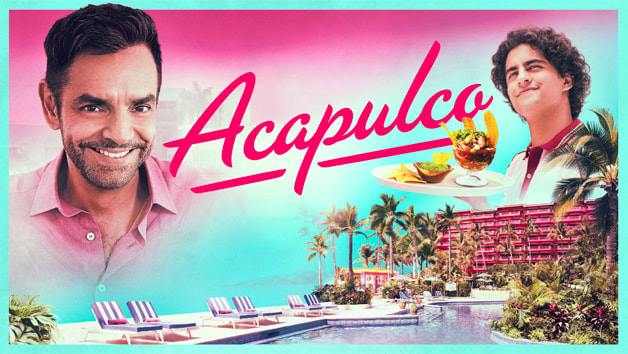The Spanish-born actor will next be seen starring in Apple TV+’s upcoming bi-lingual comedy series.
The show will premier globally on October 8th. Created by Austin Winsberg, Eduardo Cisneros and Jason Shuman, Acapulco is a half-hour Spanish- and English-language comedy that centers on Maximo, a young Mexican man whose dream comes true when he gets the job of a lifetime at the hottest resort in Acapulco. Rafael Cebrián plays Hector, an energetic poolside employee at the resort.
The show takes place in 1984, with Eugenio Derbez narrating and playing the present-day version of the main character. Also reprising his role from the movie is Alejandro, who plays Hugo, Older Maximo’s nephew.
The multitalented Rafael Cebrián was classically trained in London and a graduate of Brown University. His fluency in English, Spanish, French and Italian opened doors to roles in Europe and the U.S. and his television credits include starring in GREENHOUSE ACADEMY for Netflix and roles in ANIMAL KINGDOM, NARCOS and Tom Fontana’s BORGIA.
He recently starred in the 2020 Ariel-nominated Lionsgate film SONORA, directed by Alejandro Springall and produced by Guillermo del Toro and wrapped production on Paramount Pictures’ feature film, THE RAY.
His father, Juan Luis Cebrian, co-founded El Pais, the leading daily newspaper in Spain, while his mother, Teresa Aranda, was a newscaster-journo for state-backed TVE. But Rafael opted for music, studying classical piano for 13 years.
His fluency in various languages has allowed Rafael to experience and appreciate different cultures from deeper and complex perspectives.
His experiences have allowed him to be a voice for Hispanics around the world and to provide representation in the film industry.
A Chat With Rafael Cebrián
What is the main difference in the experience of filming a bilingual series from an only English series?
The obvious difference is that almost everyone on set speaks multiple languages, so you’re constantly exposed to multiple cultures (in our case the Mexican and the American cultures). It’s such a unique and enriching opportunity. As for my personal experience, I’m fluent in both Spanish and English. It was fun to constantly juggle from one language to the other. I will say, this wasn’t my first bilingual project. And at the end of the day, we all speak the same language on set. That language is film.
What have been some of the difficulties you’ve encountered while filming “Acapulco”?
I had to unlearn 14 years of American dialect coaching to go back to my original Spanish accent I had when I first got to the U.S! That was pretty difficult for me- rolling those r’s.
This first season of the show was shot in Puerto Vallarta during the pandemic. We were essentially in a bubble. People were rarely able to come in or out. We basically lived where we worked, and even though it may sound convenient, it could feel a little heavy at times and we would all go a little stir crazy. My favourite thing about getting to film abroad is the fact that we get to fully immerse ourselves in the culture of the country where we are working. Unfortunately, due to the circumstances, we missed out on doing that this time around.

What do you think is the importance of having bilingual shows on big platforms such as Apple TV+?
Language is a window into a culture. Having a multilingual show on a big streaming platform like Apple TV+ gives international audiences the chance to better understand the cultural context of the story. Hence why I think we should always watch movies or shows on V.O with subtitles; never dubbed. But honestly, I don’t think the importance comes from being bilingual so much as it comes from being authentic and truthful to the world it represents. There is an immense amount of value in vouching for content that is honest, and that pretends nothing else other than just telling it as it is and showing it as it looks.
What is a lesson everyone should learn about Hispanic Heritage Month?
That we exist, and we come in many shapes & forms. The term “Hispanic” was created here in the U.S, but outside of this country, we don’t go around the world calling ourselves that. We say we are “Mexicans”, “Argentineans”, “Spaniards”, “Colombians” … There’s so much diversity that comes along with the term “Hispanic” that isn’t yet understood here. In the U.S “Hispanic” is used as an englobing term to label everything south of the border, and that’s where we have it tilted.
Published by HOLR Magazine


